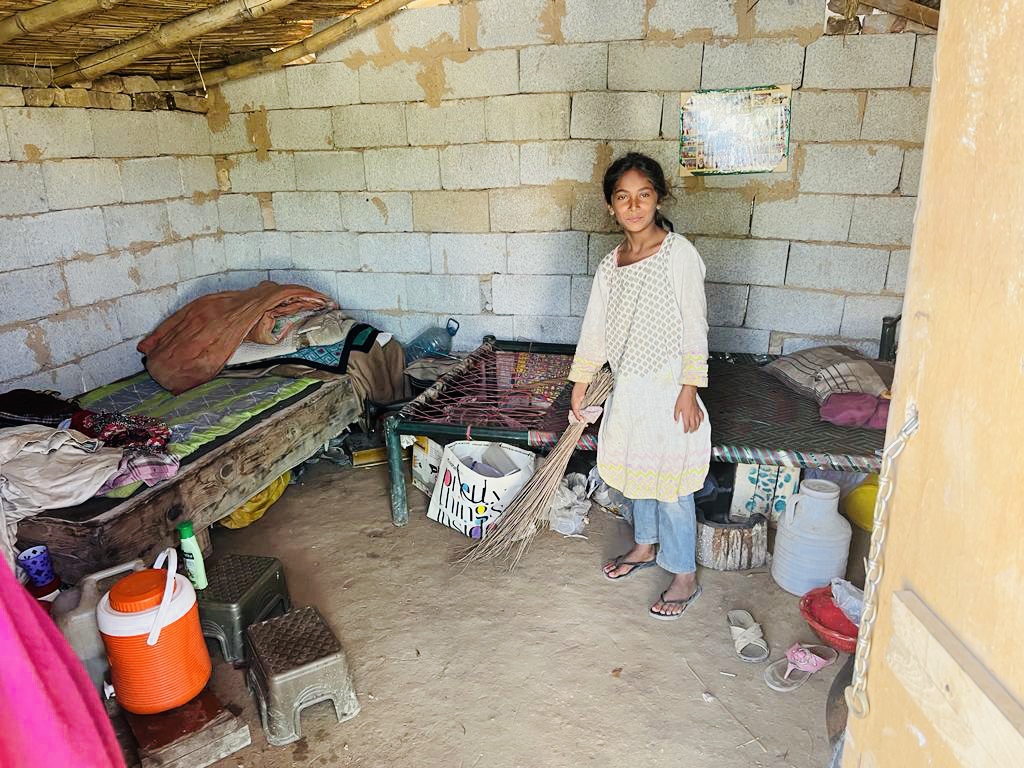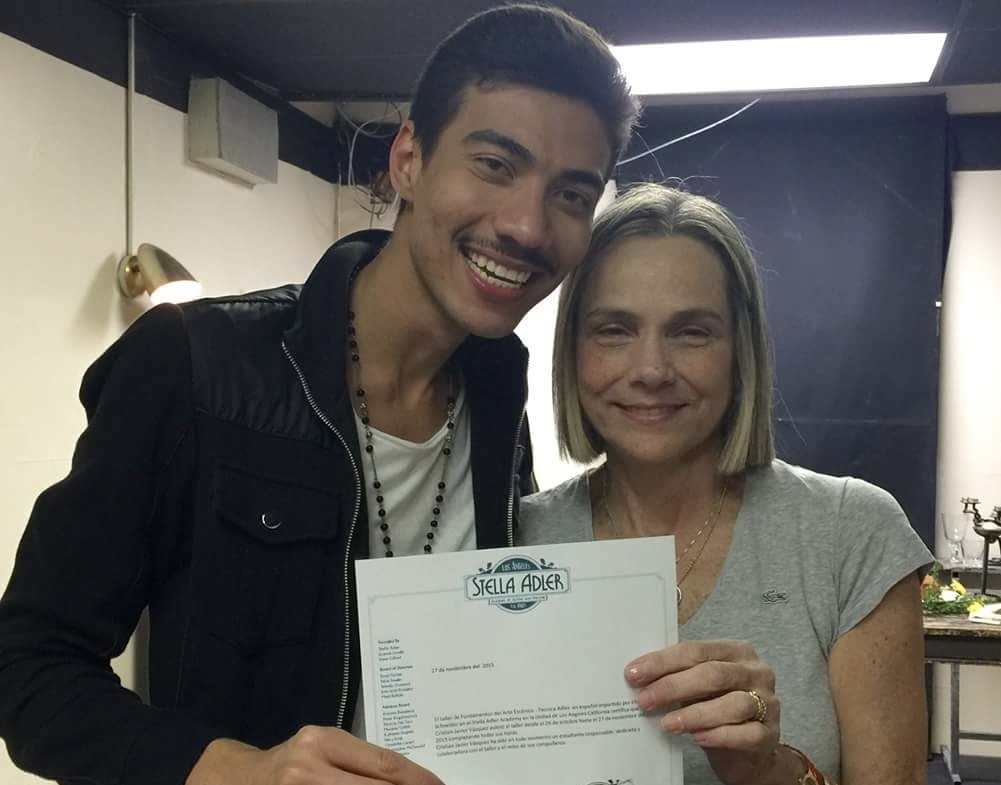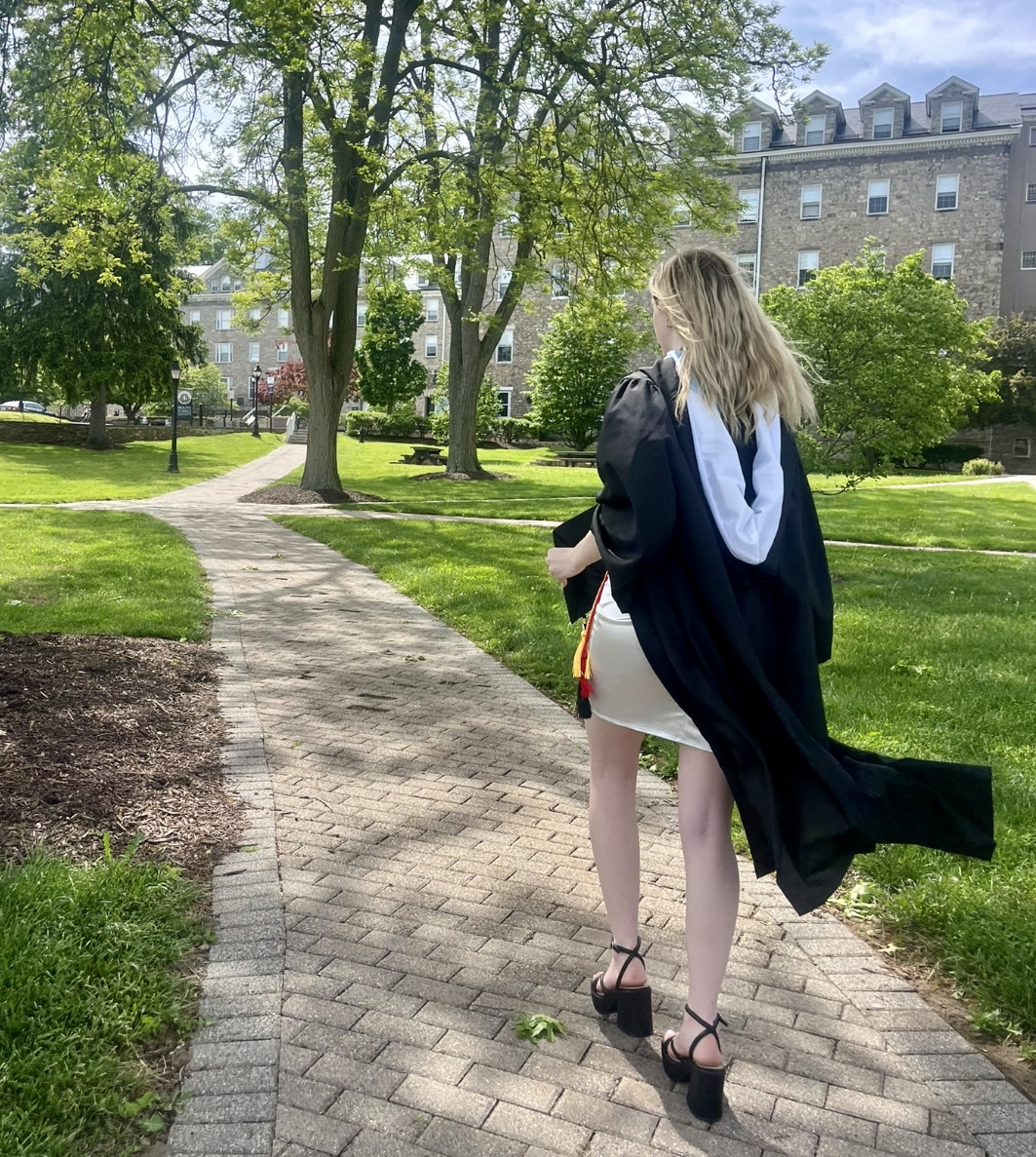(ISLAMABAD,Pakistan)— Pehli Kiran, an open-air tent school, offers a beacon of hope to the city’s poorest. In a country where education is underfunded and almost 22 million children—mostly girls—remain out of school, principal Sakina Jamshed is providing hope for the children in Islamabad’s slums where she was once a student herself.
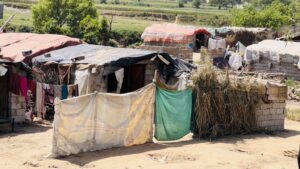
Maira Akku, an impoverished area on the outskirts of the F8 Sector in Islamabad [Credit:Neelum Nawab]
“My family who initially didn’t want to send me and my sisters to school now help us by going around the community to motivate other families to send their girls to school by giving my example,” Jamshed said with a smile.
Today in Jamshed’s PK school, girls make up more than 55% of the students.Previously, there were fewer than 9% girls in a class of 65 students.
“I was rescued from the darkness of illiteracy by an angel in the shape of Mam Ayesha when I was eight and begging at a street corner,” said Shazia Khan, a 20-year-old teacher.
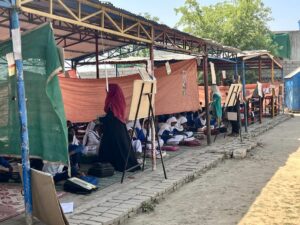
1st though 5th grade students attend class at the PK tent school in Islamabad [Credit: Neelum Nawab]
In 1960, Islamabad’s founders imagined a capital city for the country’s political and bureaucratic elite. Six decades later, it is criticized for lacking public housing for the poor, who work in menial jobs and as domestic servants for the wealthy.
As a result numerous slum areas cropped up throughout the city when large numbers of people moved to the capital city from rural areas in search of jobs.Because their homes in the slums are not legally recognized, many find it hard to enroll their children in registered schools.
According to a UNICEF report, “Pakistan has the world’s second-highest number of out-of-school children with an estimated 22.8 million children aged 5-16 not attending school, representing 44 percent of the total population in this age group”
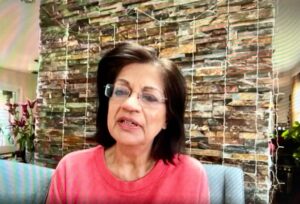
Sabira Qureshi, Women rights activists. Founder of Pehli Kiran Tent Schools [Credit: @sabiranq]
According to the Human Rights Watch report, Pakistan: Girls Deprived of Education, 32% of primary school-age girls are out of school in Pakistan, compared to 21% of boys. By grade six, 59% of girls are out of school, versus 49% of boys. Only 13% of girls are still in school by ninth grade.”
From 10 children under a tree to 3,600 under tents
![Suleman and his siblings, searching the rubble in search of metal. [Credit: Neelum Nawab]](https://theclick.news/wp-content/uploads/2022/05/51305529-0110-44da-bbb2-502ba336ad9d-300x225.jpg)
Suleman and his siblings, searching the rubble in search of metal. [Credit: Neelum Nawab]
“The Pehli Kiran School model is based on bringing school to children, not the children to school as these communities don’t have easy access to school,” said Qureshi.
Not far from one of the tent schools in Islamabad, three children were sifting through a pile of rubble.
“I’m searching for metal, I will sell it for a hundred rupees if I find a big piece,” said Suleman. He wasn’t sure of his age, 11, or maybe 12. Suleman’s father was taken by the police (he didn’t know exactly why). Now, he has two sisters, two brothers and a mother to feed. He and his sisters look for anything of value in the heaps of rubble of the neighborhood he can sell for about 100 Pakistani Rupees, or 53 cents, to help feed his family.
![Pehli Kiran Tent School in Maira Akku, Slums of Islamabad [Credit:Neelum Nawab]](https://theclick.news/wp-content/uploads/2022/05/PHOTO-2022-04-19-01-47-45-1-300x225.jpg)
Pehli Kiran Tent School in Maira Akku, an impoverished area of Islamabad [Credit: Neelum Nawab]
As kids were passing through the broken, uneven pathways through houses built with tents and mud, a girl peeked out of her house door and watched the kids going to tent school across the street.
Aliza, who believes her age to be 9, said it’s been one year since she went to school. She passed the second grade and was in third grade when she left.
“I like to hear the school bell ring and watch other kids going to school. I wish one day to go to school instead of watching other kids go, everyday from here across the street,” she said wistfully.
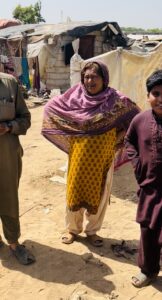
Sabeen, mother of three girls says,”Going to school won’t feed my girls.” [Credit: Neelum Nawab]
My husband died and I’ve sugar and diabetes,” she said. As to why her three daughters are not in school she said, “Going to school won’t feed my girls. I’ve to send them to clean houses to make ends meet as I can’t work due to a broken arm. ”
Bina is the mother of sons in first, second and fifth grade at the school. She works as a cleaning lady while her husband works at a nursery.
“The principal of this school came to my house and convinced my husband and myself to send our children to their school as we can not afford to send our children to school and pay tuition fee to go to government school which is far from where we live,” he said.
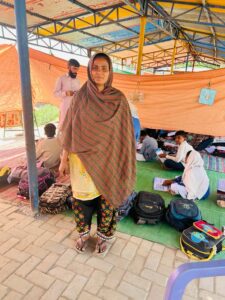
Bina, a cleaning lady, sends her three sons to the tent school. [Credit: Neelum Nawab]
“The principal of this school came to my house and convinced my husband and myself to send our children to their school as we can not afford to send our children to school and pay tuition fee to go to government school which is far from where we live,” he said.
“It’s difficult for these children to give time to their studies since their background is not strong. On top of that, they’ve to go to work after attending school or those who come in the evening shift are coming from work so we don’t give them any homework, ” said Mohammed Asghar, a teacher at Pehli Kiran school.
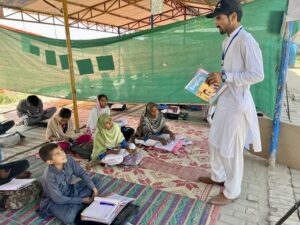
Mohd Asgher teaches his Students in the class at Tent school while continuing his Masters in the evening at a University. [Credit: Neelum Nawab]
Most girls not allowed after elementary schooling
During interviews with several girl students they talked again and again about their desire for further education and wish to become “a teacher or a doctor” but worry that they might not be allowed to continue after fifth grade.
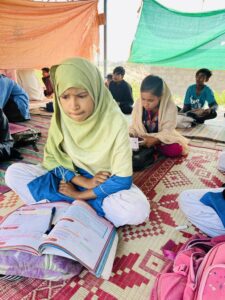
Tehmina fears being stopped from going to school after fifth grade. [Credit: Neelum Nawab]
“This entire project depends on philanthropic donations and is entirely charity based,”she added.
One student’s journey from tent school to national stage
Kanwal Gulshan, a resident of Maria Aku slum, Islamabad, and a former student of a tent school PKS5, made history by going to FIFA 2018 in Russia.
Gulshan is breaking many stereotypes about Pakistani girls, particularly poor girls not even allowed to go to school, let alone play sports. When she told her father she wanted to go, he did not know what FIFA was. “My school principal told him what a tremendous achievement it was,” she said.
![Many lithium-ion cells will be contained in one module. [Credit: Screenshot from the public document Outline Battery Fire Safety Management Plan from Sunnica Limited.]](https://theclick.news/wp-content/uploads/cache/2022/05/Screen-Shot-2022-05-01-at-6_43_57-PM/1832525788.png)
![Modules will be stacked vertically within a rack. The containers will have multiple racks that can be accessed from one end of the enclosure.
[Credit: Screenshot from the public document Outline Battery Fire Safety Management Plan from Sunnica Limited.]](https://theclick.news/wp-content/uploads/cache/2022/05/Screen-Shot-2022-05-01-at-6_50_56-PM/139288338.png)
![The modules are then stacked vertically to make up one rack. The containers will have multiple racks. [Credit: Screenshot from the public document Outline Battery Fire Safety Management Plan from Sunnica Limited.]](https://theclick.news/wp-content/uploads/cache/2022/08/Screen-Shot-2022-05-01-at-6_51_05-PM/477951179.png)
![This is what the final BESS containers look like once they are installed. The BESS enclosures will be modified ISO shipping containers or modular pre-manufactured containers according to Sunnica’s outline. Sunnica reports that the maximum dimensions of the containers will be 17 meters by 5meters and 6 meters high from the ground up. [Credit: Screenshot from the public document Outline Battery Fire Safety Management Plan from Sunnica Limited.]](https://theclick.news/wp-content/uploads/cache/2022/05/Screen-Shot-2022-04-14-at-7_52_03-PM/2625937259.png)
“When I was 14, the first-ever coach came to our school from Right to Play, and she taught girls to play football. Otherwise I didn’t know about what football was other than watching it on TV occasionally,” said the thin-framed Gulshan about her journey from the slums to FIFA2018 Football.
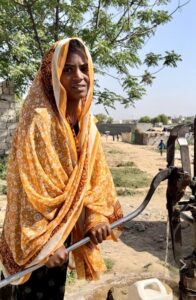
Sadia is not allowed to continue school after fifth grade. [Credit: Neelum Nawab]
“When I used to play as a student, I would tell myself that when I become a coach, I’ll teach my students to play their best,” she said.
Gulshan, who found her footing in the PK tent school, now an eleventh grader coaches for girls at the same school and plans onto do Masters in Sports Psychology to be the best Coach to optimise her athletes performance.
Presence in the slums is a strength
According to Qureshi, “Our presence and strong relationship in the slums community is our strength. Any organization, non-profit, even government, uses us for their vaccination drive, immunization, and other help to bring awareness they need around this community.”
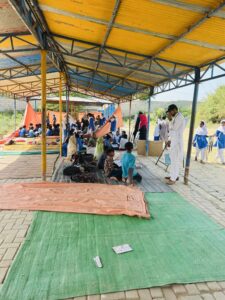
At the end of the day, everyone helps pack up the tent school . [Credit: Neelum Nawab]
It’s not unlike schools all over the world except perhaps this one has walls of fabric.
The school bell rang bringing the school day to an end, all the children started wrapping up their school bags to go home with some students folding the sheets and tents to pack up the school only to unpack it the next morning when it’s time to learn again.
